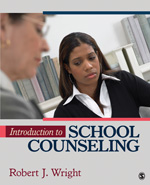Introduction to School Counseling
Robert J. Wright
A practical guide that helps readers meet the challenges they'll face as professional school counselors
This comprehensive graduate-level text prepares readers to handle the problems and responsibilities they'll face as professional school counselors, preschool through high school. It covers a wide range of topics in-depth, including: effective interventions for racism and bullying, the continuing score gap between ethnic groups, a school counselor's leadership role in implementing school-based action research, a model for advocating on behalf of, and providing services to children with disabilities. The book is packed with real life examples and case descriptions: it provides strategies for preventing and responding to social and emotional problems, improving educational outcomes, and helping children score at optimum levels on high-stakes tests.
Available formats
See what’s new to this edition by selecting the Features tab on this page. Should you need additional information or have questions regarding the HEOA information provided for this title, including what is new to this edition, please email sageheoa@sagepub.com. Please include your name, contact information, and the name of the title for which you would like more information. For information on the HEOA, please go to http://ed.gov/policy/highered/leg/hea08/index.html.
For assistance with your order: Please email us at textsales@sagepub.com or connect with your SAGE representative.
SAGE
2455 Teller Road
Thousand Oaks, CA 91320
www.sagepub.com
Instructor Teaching Site
Test Bank (Word): This Word test bank offers a diverse set of test questions and answers for each chapter of the book. Multiple-choice, true/false, short-answer, and essay questions for every chapter help instructors assess students’ progress and understanding.
PowerPoint Slides: Chapter-specific slide presentations offer assistance with lecture and review preparation by highlighting essential content, features, and artwork from the book.
Lecture Notes: These lecture notes summarize key concepts on a chapter-by-chapter basis to help instructors prepare for lectures and class discussions.
Video Links: Carefully selected, web-based video resources feature relevant interviews, lectures, personal stories, inquiries, and other content for use in independent or classroom-based explorations of key topics.
E-flashcards: These study tools reinforce students’ understanding of key terms and concepts that have been outlined in the chapters.
SAGE Journal Articles: A “Learning From SAGE Journal Articles” feature provides access to recent, relevant full-text articles from SAGE’s leading research journals. Each article supports and expands on the concepts presented in the chapter. This feature also provides discussion questions to focus and guide student interpretation.
Video Links: Carefully selected, web-based video resources feature relevant interviews, lectures, personal stories, inquiries, and other content for use in independent or classroom-based explorations of key topics.
Web Resources: These links to relevant websites direct both instructors and students to additional resources for further research on important chapter topics.
Web Quizzes: Flexible self-quizzes allow students to independently assess their progress in learning course material.
Key Features:
- Focus on the consultative role of the school counselor: includes ideas for developing a consulting practice within the school, for overcoming resistance, and for developing the flexibility to move to different school counseling venues, including counseling in virtual schools.
- A solid grounding in measurement and research helps readers develop the ability to interpret, evaluate, and explain standardized test scores and other data to colleagues, students, and parents. It also empowers the school counselor to take a leadership role in school based action research and program evaluation.
- Multicultural techniques for counselors, drawn from both current literature and the author's own experience growing up and later teaching in an inner-city environment, are included, along with techniques for assisting children with undocumented and language-minority parents.
- In-text learning aids include chapter-opening introductions; chapter-ending summaries and discussion questions; chapter objectives; cartoons, photos, and tables; a complete glossary, and 39 Case in Point features that provide problematic counseling scenarios and resolutions.
- The ASCA statement of Ethical Standards for School Counselors is reprinted inside the front and back covers to provide a quick reference for counselors as they establish their school-based practices. These ethical principles are imbued throughout the book's narrative.

